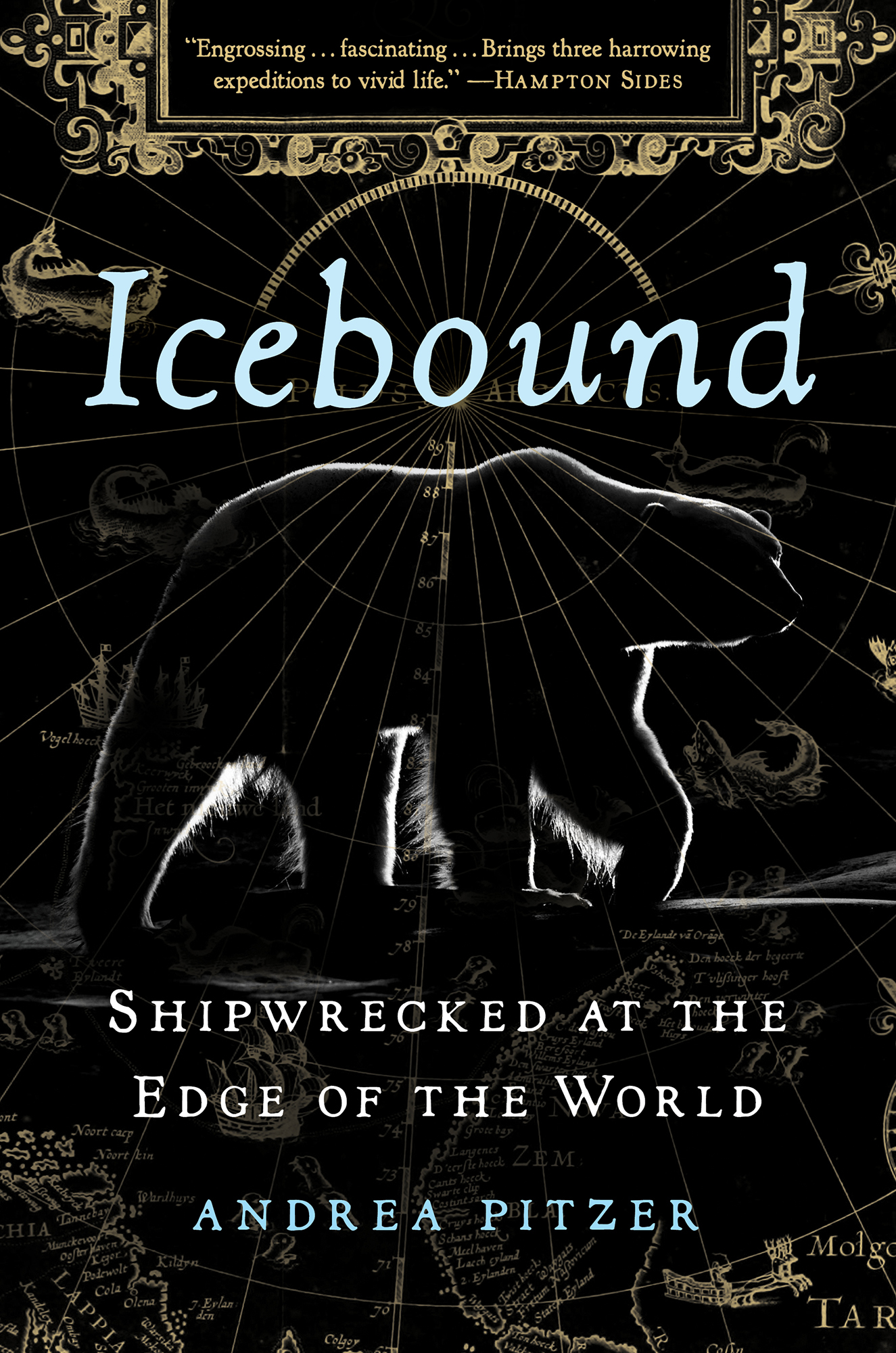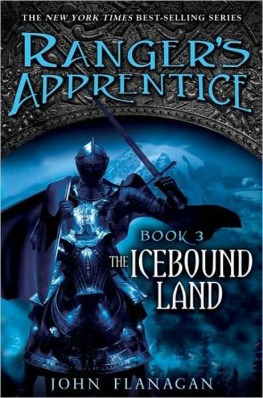Andrea Pitzer - Icebound: Shipwrecked at the Edge of the World
Here you can read online Andrea Pitzer - Icebound: Shipwrecked at the Edge of the World full text of the book (entire story) in english for free. Download pdf and epub, get meaning, cover and reviews about this ebook. year: 2021, publisher: Scribner, genre: Adventure. Description of the work, (preface) as well as reviews are available. Best literature library LitArk.com created for fans of good reading and offers a wide selection of genres:
Romance novel
Science fiction
Adventure
Detective
Science
History
Home and family
Prose
Art
Politics
Computer
Non-fiction
Religion
Business
Children
Humor
Choose a favorite category and find really read worthwhile books. Enjoy immersion in the world of imagination, feel the emotions of the characters or learn something new for yourself, make an fascinating discovery.

- Book:Icebound: Shipwrecked at the Edge of the World
- Author:
- Publisher:Scribner
- Genre:
- Year:2021
- Rating:3 / 5
- Favourites:Add to favourites
- Your mark:
- 60
- 1
- 2
- 3
- 4
- 5
Icebound: Shipwrecked at the Edge of the World: summary, description and annotation
We offer to read an annotation, description, summary or preface (depends on what the author of the book "Icebound: Shipwrecked at the Edge of the World" wrote himself). If you haven't found the necessary information about the book — write in the comments, we will try to find it.
Icebound: Shipwrecked at the Edge of the World — read online for free the complete book (whole text) full work
Below is the text of the book, divided by pages. System saving the place of the last page read, allows you to conveniently read the book "Icebound: Shipwrecked at the Edge of the World" online for free, without having to search again every time where you left off. Put a bookmark, and you can go to the page where you finished reading at any time.
Font size:
Interval:
Bookmark:


MORE PRAISE FOR ICEBOUND
One of the most remarkable survival stories In Andrea Pitzers telling, the utter relentlessness of the challenge to stay alive is never anything less than compelling.
Peter Stark, author of Last Breath and Young Washington
Beyond thrilling. Beyond enthralling. I found this a tale so involving that I simply couldnt put it down.
Martin W. Sandler, author of 1919 and The Impossible Rescue
An epic tale of exploration, daring, and tragedy told by a fine historianand a wonderful writer.
Peter Frankopan, author of The Silk Roads: A New History of the World
Gives readers a new understanding of the phrase uncharted territory Methodically researched and elegantly told.
Beth Macy, author of Dopesick and Factory Man
A true pleasure. In chapters that are vivid, fast-paced, and meticulously researched, Pitzer takes us into the fierce world of polar exploration before the age of Shackleton. Her account breathes life into the forgotten quest of William Barents to find a Northeast Passage.
Michael F. Robinson, author of The Coldest Crucible
Allows a glimpse into the true nature of human courage. This is a book you will not want to put down, except to catch your breath.
William E. Glassley, author of A Wilder Time
Accomplishes for William Barents what the explorer could not do for himself: rescue his amazing life from the grip of the Arctic and centuries of hagiography. The Barents who appears in Pitzers spyglass seems impressively close to the actual man: intensely bold, highly skilled, and catastrophically wrong.
P. J. Capelotti, author of The Greatest Show in the Arctic
Fascinating, bizarre, and very human A riveting account of lives drawn into a world that seems at once dream and nightmare.
Blair Braverman, author of Welcome to the Goddamn Ice Cube
A compelling story, full of danger, shipwrecks, and failure, but noble and heroic as well. Some in Barentss party didnt make it, but it was remarkable that so many managed to survive.
Anthony Brandt, author of The Man Who Ate His Boots
An enchantment. Pitzer expertly draws the reader into landscapes so unfamiliar and unsettling that they may as well be stolen from science fiction. [Features] ordeals thatto todays readerscan seem nearly unimaginable.
Steve Silberman, author of NeuroTribes
For Joe

I n 1594, while Spain laid siege to the Netherlands in the third decade of a bloody war, Dutch navigator William Barents prepared to sail off the edge of the known world. He would leave in the spring for distant Nova Zembla, whose shores stretched hundreds of miles above the Russian mainland. He intended to follow its coastline north as far as he could go.
Money drove every part of the project, providing both the means and the goal of the expedition: investors were looking to discover a northern trade route to China. But the voyage might also answer fundamental questions about the Earth. Was Nova ZemblaNew Land in Dutchan island that could be circumnavigated, or was it part of a polar continent that would make a northeast passage impossible? The former might mean lucrative trade with the Far East. The latter would mean vast new lands to discover.
No ship in recorded history had ever sailed north over Nova Zembla, or that far north above Europe at all. As one half of a small fleet charged with mapping territory in waters known and unknown, William Barents intended to embrace this challenge and head into uncharted waters. Meanwhile, two other vessels would sail south of Nova Zembla, close to the mainland. The southern route had been tried by other explorers, but so far none had reached China.
Barentss home country, the Dutch Republic, was just over a decade old at that moment. Across the next century, it would become the worlds leading economic and naval power. It would surpass all other countries in shipbuilding. The transcendent art of Rembrandt and Vermeer would appear. A flowering of the spice trade and slavery would also sustain the country through decade after decade of a forever war during the attempt to defeat Spain. The art, the war, the slaves, and the spices would all combine to transform the young, tiny republic into a country as powerful as any on the planet. William Barents would play a role in that drama, but as he readied himself for his first voyage into the Arctic, his country was a blank slate, its sins and achievements still unwritten.
The historical record on William Barents before this moment is nearly as blank. Born in the northern Netherlands near the midpoint of the sixteenth century, he was likely in his forties when he left home on his first Arctic voyage, but the year of his birth is unknown. He had trained as a steersman and had a childhood fascination with maps that endured into middle age. I always had the inclination, from my youth onward, he wrote of himself, to use all my qualities to portray in maps the lands that I roamed and sailed with all the surrounding seas and waters. His most famous portrait shows a receding hairline, dark hair, sloping shoulders, and a nose like a chisel. Given the images creation three centuries after Barentss death, maritime historian Diederick Wildeman has suggested that any connection to the historical Barents is dubious.
With no aristocratic pedigree, its apparent from his writing that Barents had nonetheless gotten an education. Before he ever made preparations for the Arctic, hed likely sailed all the shores of Western Europe, from the Baltic Sea to the Portuguese coast. At a time when war led most Dutch sailors to turn away from the Strait of Gibraltar between Spain and Morocco, Barents pioneered mapmaking in the region. His New Description and Atlas of the Mediterranean Sea, written with the influential preacher and geographer Petrus Plancius, would soon make its way into print. Yet as he walked the long canals of Amsterdam, his voyages to the Mediterranean all lay behind him. He would never unfurl a sail in Spanish waters or see the coast of Italy again.
If his countrys future wasnt yet written, he was as good a candidate as any to invent it. He couldnt yet knowno one in the port, in the city, in the country that day could knowthat after his death hed be memorialized across the centuries. His name would appear everywhere: on the streets of countless cities and towns in his home country, as well as California, Bulgaria, and Bashkortostaneven on the door of a hotel bar in Longyearbyen, the northernmost town in the world.
But he wasnt famous yet. He was simply a navigator hired to carry out commercial exploration thought up by others and backed by men of wealth. As he stood on the docks about to begin his long, painful trek into immortality, he was so far from fame that history would not even record the name of his boat.
War between the Dutch Republic and Spain had begun in Barentss youth, and would last until the end of his life. Spains claim to the Low Countries undergirded every part of the rebellion. In 1567, Spain sent the third duke of Alva to the Netherlands with an army of ten thousand men to establish order. That September, the count of Egmontwhod previously fought in battle for Spain and been knightedwas arrested. Condemned for treason over his reluctance to punish his own people, he was beheaded the following June.
Font size:
Interval:
Bookmark:
Similar books «Icebound: Shipwrecked at the Edge of the World»
Look at similar books to Icebound: Shipwrecked at the Edge of the World. We have selected literature similar in name and meaning in the hope of providing readers with more options to find new, interesting, not yet read works.
Discussion, reviews of the book Icebound: Shipwrecked at the Edge of the World and just readers' own opinions. Leave your comments, write what you think about the work, its meaning or the main characters. Specify what exactly you liked and what you didn't like, and why you think so.





